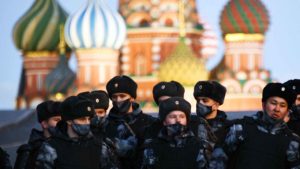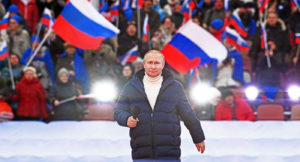The Nineties were a time of American hegemony and British cockiness. The internet was a utopian idea as opposed to a collective psychological disorder. Climate change, terrorism, autocracy and gross inequality were either not-on-the-radar or assumed to be moving in the right direction. From the vantage point of 2022, that period between the fall of the Berlin Wall and 9/11 seems impossibly sunkissed. What did we have to worry about?
Well, with the gift of hindsight, the collapse of a vast, ideologically-driven nuclear superpower into social, economic and moral anarchy might have concentrated more western minds than it did. “Nyebyezopasnost” is the word Russians (and Ukrainians, Georgians, Kazakhs, etc…) often use to describe their Nineties, usually translated as “insecurity” — though “never-without-danger” is closer to its actual sense. For the ordinary Russians whose voices were collected by the Belarussian writer, Svetlana Alexievich in Second-hand Time (2015), her remarkable oral history of the Soviet collapse, it was a period of chaos, anger and despair. Through her polyphony of voices, Alexievich sounds the void that is left when both security and meaning are removed from a society overnight.
This is pretty much what happened in the Russia of the Boris Yeltsin era, as “Capitalist Shock Therapy” was imposed under the Washington Consensus, criminals flourished, savings evaporated with hyper-inflations, as many as seven million people died what would later be termed “Deaths of Despair“, and the Economics Minister, Yegor Gaidar, appeared on Russian TV, trying to teach a dazed nation how to sell mineral water. Nothing that counted before counted anymore. “For twenty, thirty years, people were on the waiting list for an apartment,” complains Marina, a 63-year-old Belarusian woman, interviewed by Alexievich. “Then, one day, Gaidar comes and laughs in our faces: Go ahead and buy one! With what money?…We spent our whole lives believing that one day, we would all live well. It was a lie! A great big lie!”
Notwithstanding the evils in the Soviet experiment and the cynicism and dysfunction that characterised its Eighties iteration, it is just never a good idea to leave such a void untended. You don’t know what will come to fill it, though in retrospect, Putin’s construction of a “military Disneyland” for children; his Orthodox-Death Star Cathedral of the Armed Forces; his “Eternal Regiment” marching at the annual Victory Parade day parade — all this should really have rung a few alarm bells. In her introduction, Alexievich gives plenty of warning. “Today, people just want to live their lives, they don’t need some great idea,” she writes:
“This is entirely new for Russia; it’s unprecedented in Russian literature. At heart, we’re built for war. We were always either fighting or preparing to fight. We’ve never known anything else — hence our wartime psychology. Even in civilian life, everything was always militarised. The drums were beating, the banners flying, our hearts leaping out of our chests. People didn’t recognise their own slavery — they even liked being slaves.”
Alexievich, born in Ukraine in 1948, won the Nobel Prize for Literature in 2015 for her “documentary novels”, which occupy a contested zone between journalism and artistic endeavour. Her 1985 book The Unwomanly Face of War, which related the Great Patriotic War (as Russians label World War Two) through the voices of women, sold over two million copies in the USSR. She has also written about the Soviet-Afghan war, Chernobyl, and the epidemic of suicide in the former USSR — and, inevitably, incurred the displeasure of the Alexander Lukashenko regime in Belarus, though she remains in Minsk, where she has spoken out against the war. “Those people who were brought up by their Soviet parents, taught by Soviet teachers on Soviet textbooks, are now Soviet people…The romanticism of slavery is still living in the people who do not have anything, who are victims themselves, talk about the pain they are in, but still are confident that ‘we used to be great’. That is what lives in them.” It will take a long time “to squeeze the Soviet slave” from the national character.
Alexievich would know: she is, self-confessedly, a sovok. This is a disparaging term both for the USSR itself (it literally means “dustpan”) and for the individuals shaped by it. Alexievich is interested in how history plays out within this “miniature expense” of the human individual. “It’s where everything really happens,” she writes. Of course, it’s where it happens for presidents and his siloviki too — and Putin (born 1952) would also be a sovok. In fact, you can almost imagine the Nineties Putin among the anonymous chorus of voices in Second-hand Time, complaining that he now has to drive a taxi, his secret service income isn’t enough to live by, muttering darkly about the great betrayal.
Alexievich’s subjects range across the former USSR and across the decades. There are dissidents and true believers, exiles, émigrés, victims of sectarian violence in Azerbaijan, Abkhazia and Tajikistan, and ordinary consumers, too, sincerely delighted at finally being able to get hold of western appliances, as colourful as possible, as everything used to be so grey. (“There’s loads of everything. You want to spoil yourself, indulge. It’s therapeutic. We’re all so sick”.)
But almost everyone is bewildered. “The discovery of money hit us like an atom bomb,” says one interviewee. The idea of being poor didn’t really exist in the USSR; the common man had status, however theoretical it might have been. An unrepentant communist laments the fact that in the Soviet era, the streets had names like Metallurgists Avenue and Proletariat Street. Now, everything is being renamed Noble Street and Merchants Quarter. “Not everyone is capable of stopping at nothing to tear a piece of the pie out of somebody else’s mouth,” she says. She sincerely believed she was striving for freedom.
And yet, those who opposed communism were also at a loss — especially the intelligentsia who gathered in kitchens to discuss banned literature and tell jokes about the party. One describes the pleasure of “external migration of the mind” that was possible under communism. He managed to secure a demotion from engineer to janitor, which meant 30 less roubles a month but who cares? There was nothing to buy anyway and more time to read. One of the first things that happened, post-1991 was that the second hand shops began to fill with books — now utterly useless.
But curiously, it is those who had suffered the cruellest excesses of Soviet ideology who appear the most anguished. The Nineties was the decade of realising that any sacrifices made in the name of the Motherland had been meaningless. If there is anything worse than spending years performing hard labour in Siberia, using your fist for a pillow, feeling your teeth come loose with scurvy, it is discovering that you did all that for nothing. “I spent my life building a great nation. That’s what they told us,” laments Marina the Belarussian, recalling her years working on the Abakan-Taishet railway (singing komsomolsongs all the while). “I don’t want any German biscuits or sweets. Where are my just desserts? The fruits of my labour?” Her neighbour, Sashenka, has recently covered his head in acetate and set himself on fire on the plot that he had defended from the Nazis decades earlier.
Amid the crime, disorder, murder, terrorism, despair, suicide, pornography and paranoia there is a sense, above all, of promise unfulfilled. “What did we want?” says one who had cheered on Mikhail Gorbachev’s reforms. “Gentle socialism, humane socialism.” And what did we get?…Bloodthirsty capitalism.” Time and again, people complain that they weren’t consulted. History was something that was done to them. What they wanted was equality and freedom. Not this.
As a westerner, it is hard to read all this without squirming. Was no one aware what would happen? Where the hell was everyone looking?
There are omissions in Alexievich’s narrative. She has, it becomes clear, her own version of events. I suspect much of this is, in fact, crafted for western ears (there are surprisingly few criticisms of the West) and I can’t help wonder about the voices she omitted or embroidered. More concerning: some of the accounts in Second-hand Time have appeared in earlier books, with certain details migrating from one story to another. However, the same accusations could be levelled at Alexander Solzhenitsyn’s The Gulag Archipelago — which is no less forceful for being a bit unscrupulously sourced.
My deeper criticism is that it tends to reinforce the idea of Russia as some great live, literary epic — a stage for tragic, meaningful suffering. This is an idea that is at once sentimental and incredibly dangerous. (All those deaths have to mean something.) But then again, one of Alexievich’s repeated themes, actually, is how you can’t really trust books. “We lived in a world of mirages,” says the anguished dissident whose reading has proved useless. “The Russia of our books and kitchens never existed. It was all in our heads.”
Did our leaders really expect that a functioning civil society could grow out of these ruins? Was Russia left to its fate through naïveté — or cruelty? Was it “just desserts” for what Ronald Regan termed the “evil empire”? But think: after the Second World War, the Allies pumped money into West Germany, and held its hand as it came to terms with its past. No American president went to Russia and declared: “I am a Muscovite!” There was no Nuremberg for those who upheld Stalin’s many Terrors. Only a vast avant-garde neoliberal experiment, which produced accelerated versions of all the rampant inequalities, deaths of despair, and information wars that would soon consume the West.
Ultimately, Second-hand Time leaves an impression of two monsters co-habiting the Kremlin. There was the grey monolith of communism itself — a drab, totalising creature that smothered lives and yet which did, in some important respects, impart meaning and free people from other tyrannies. But there was also the dark monster of Russian autocracy, resident since the days of Ivan the Terrible. Inscrutable. Cruel. Unpredictable. Even as it changes form. “Our country has a Tsarist mentality,” says a former secret-service agent in one of the most telling interviews. “Everyone needs a Tsar. The Czechs can have their Vaclav Havel…we need a Tsar. The Tsar, the Father of the Russian people! Whether it’s a general secretary or a president it has to be a Tsar!”
The mistake was assuming that killing the first monster would smother the former. They killed the wrong monster. Whatever Russia emerges from this nightmare, we can’t make that mistake again.
Disclaimer
Some of the posts we share are controversial and we do not necessarily agree with them in the whole extend. Sometimes we agree with the content or part of it but we do not agree with the narration or language. Nevertheless we find them somehow interesting, valuable and/or informative or we share them, because we strongly believe in freedom of speech, free press and journalism. We strongly encourage you to have a critical approach to all the content, do your own research and analysis to build your own opinion.
We would be glad to have your feedback.
Source: UnHerd Read the original article here: https://unherd.com




